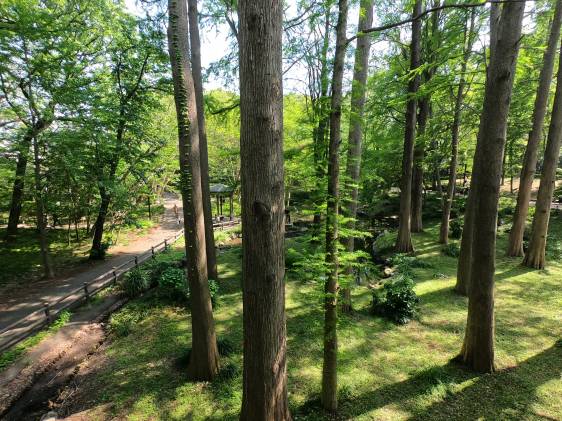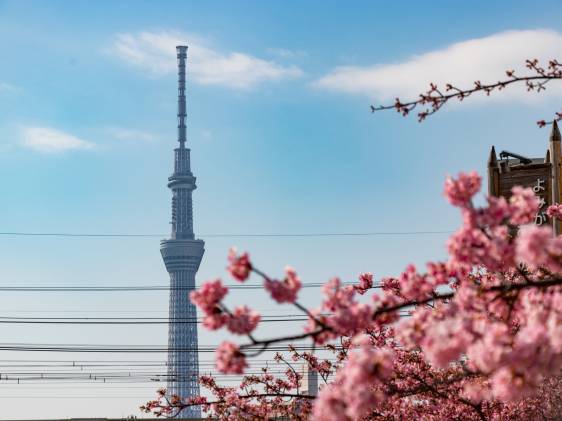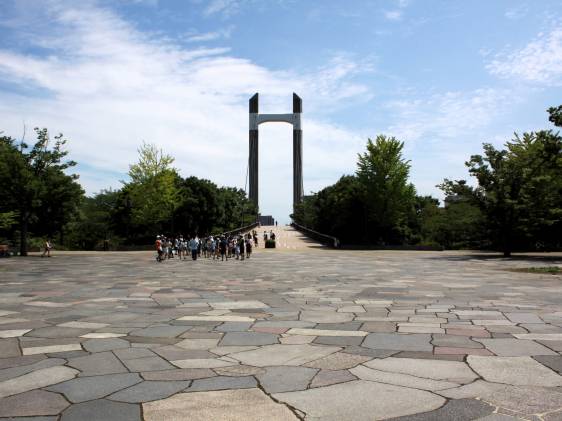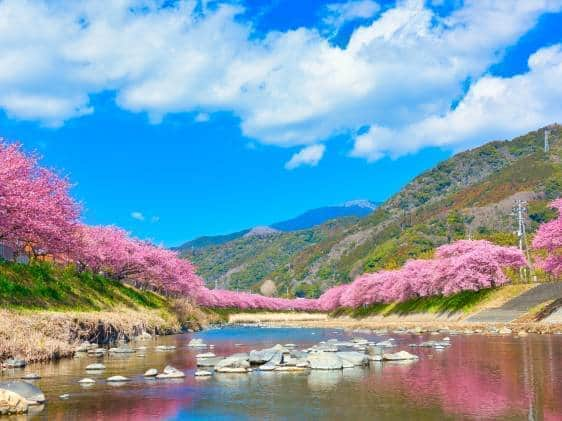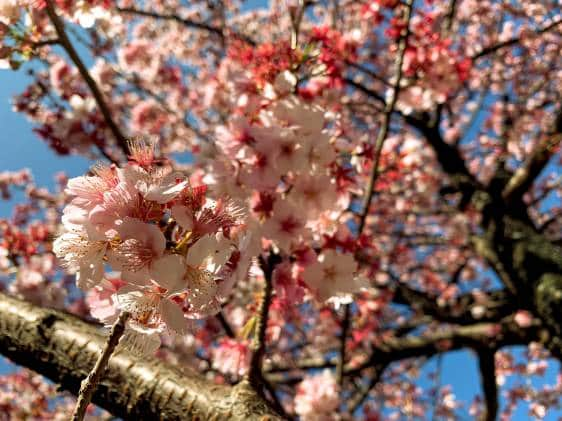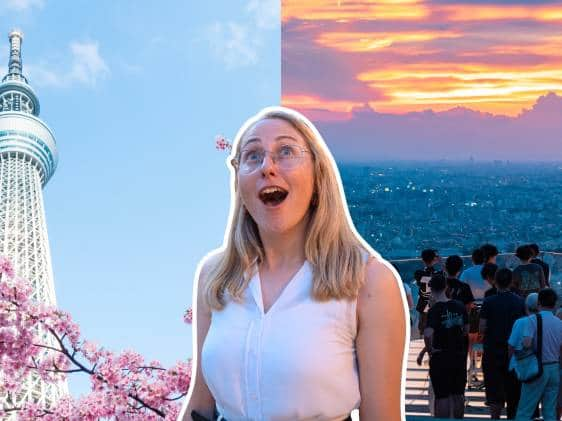You don’t have to wait until mid-March or April to see sakura in Tokyo. Kawazu-zakura are early-blooming cherry blossoms, and you can see them between early February and early March. As an added bonus, travel during this time usually means fewer crowds and lower prices!
There are actually a whole bunch of different cherry blossom varieties in Japan. The most common type of cherry blossom, which is the one associated with hanami, is called Somei-Yoshino. This is the one that the cherry blossom forecast is based on. There are also yaezakura — late-blooming cherry blossoms — which can be seen in late April.
What is Kawazu-zakura — and when does it bloom?
Kawazu-zakura is a type of cherry blossom that blooms at the end of the winter months in Japan, usually from early February to early March. The flowers are distinct due to their deep, rich pink color, and they last longer than the paler Somei-Yoshino blossom (the most common kind of cherry blossom).
You may be wondering where Kawazu-zakura blossoms come from, and here’s a hint — it’s in the name. In 1955, a chap in Kawazu Town, Shizuoka, happened upon a log on the river bed. He planted it in his garden, and it grew into what would eventually be known as Kawazu-zakura. Some of the original trees planted at that time still stand to this day.
Note: Kawazu-zakura overlap with plum blossoms, another seasonal sight worth seeking out.
5 places to see Kawazu-zakura in Tokyo

There are spots all over Tokyo where you’ll notice a Kawazu cherry tree or two: in Ueno Park by Shinobazu Pond; on Tobu Bridge with a view of Tokyo Skytree; in Inokashira Park near the Ghibli Museum; and dotted in shrines and temples such as Hatomori Hachiman Shrine, Ikegami Honmonji Temple, and Sakura Jingū Shrine.
Here, we’ve highlighted some popular and lesser-known spots to see the early blossoms, as well as some day trips that will take you outside Tokyo.
1. Yoyogi Park

Not many realize that the flowers next to the east-side toilets (not the most charming of places, we know) in Yoyogi Park are in fact cherry blossoms and not plum. There are only a few trees scattered about, but there are enough to sit down and set up a picnic blanket — or a ¥110 sheet from Daiso — for a pre-cherry blossom season hanami (flower-viewing party). Check Yoyogi Park’s X page for flowering updates.
2. Shinjuku Gyoen National Garden

You shouldn’t be surprised to find all types of cherry blossoms under the sun at Shinjuku Gyoen National Garden; there are around 65 species in total. Not only will you find Kawazu-zakura here, but also other early-blooming varieties such as Atami-zakura and Satsumakan-zakura.
You’ll find Kawazu cherry trees in front of the restaurant Yurinoki and near the management office. Check the garden’s blog for the current flowering stiuation.
Students: ¥250
Seniors: ¥250
3.Rinshi no Mori Park

A wonderful place to go on those warm days between winter and spring, Rinshi no Mori Park has a spacious lawn that is surrounded by Kawazu cherry trees. You’ll find many families settled down for a day of flower viewing, and you can do the same. Keep up to date on the flowering situation through the park’s X page.
4. Kyūnaka River

Around 15 minutes from Hirai Station in Edogawa Ward is a spot with up to 50 cherry trees in bloom at once. The view of Tokyo Skytree in the background makes for some great photos, especially if you walk down to Fureai Bridge to get it all in the frame. Check the latest flowering information here.
5. Ōyoko River and Kiba Park

One of the earliest places to bloom in Tokyo, the roughly 100 cherry trees near Kiba Park may be the highest concentration of Kawazu cherry trees in the city. Take Exit 1 from Kiba Station and turn left along the Ōyoko River — you won’t miss them.
From the right angle, you can also get a shot with Tokyo Skytree in the background. These trees tend to get going in early February, but keep track of their situation on the Kōtō Ward website.
6. Kitanomaru Park
Known as one of the most famous sakura spots in Tokyo, Kitanomaru Park is also a good place to spot some early blooms. Despite there not being many Kawazu cherry trees, if you are planning to go to the area around February, it is worth a look. The trees are near the Statue of Shigeru Yoshida and the National Museum of Emerging Science and Innovation.
Should you want to see the park in all its glory, go during March to late April and experience the mega-popular Chiyoda Cherry Blossom Festival.
Day trips to see Kawazu-zakura from Tokyo
If you want a full helping of Kawazu cherry trees, then you may have to get out of Tokyo and go somewhere with more space.
1. Miura City
1 hour 30 minutes from Shimbashi Station¥920 (one way)

On the coast of Kanagawa is Miura-kaigan, and not far from the station, you’ll find enough flowers to satisfy you for a whole spring. 1000 Kawazu-zakura trees line the road towards Komatsugaike Park, and the city’s annual festival will not disappoint you with things to do and see. There will also be nighttime illuminations for that perfect pink glow.
2. Matsuda Town
1 hour 15 minutes from Shinjuku Station (plus 20-minute walk)¥800 (one way)

Matsuda Town is known for wintersweet shrubs, and also for their cherry blossom festival that takes place every year from February to March. Around 360 Kawazu-zakura trees cover the south side of Mt. Matsuda, which offers a great vantage point for gazing at Mount Fuji.
| At the door: ¥300 | ||
3. Kawazu Town
2 hours 30 minutes from Tokyo Station¥5,930 (one way)

As Kawazu-zakura originated in Kawazu Town, you can bet that they put on a party that’s bigger, better, and has more cherry blossoms (about 8,000) than anyone else. The Kawazu Cherry Blossom Festival usually runs from February to March, depending on the flowering situation, and will have night-time illuminations.
Other early-blooming cherry blossoms
Atami: Marvel at Atami-zakura
45 minutes from Tokyo Station¥4,270 (one way)

Kawazu-zakura is the most famous early-blooming blossom, but it isn’t the only variety to bloom at the end of the winter months. Enter Atami-zakura. From the name, you may be able to guess that this variety is cultivated in Atami (in Shizuoka).
They sprout a whole month before Kawazu cherry trees, and last for around a month, too. If you are here from January to February, you should catch the Itokawa Cherry Blossom Festival, which takes place only 15 minutes from Atami Station. Check Atami’s homepage for the current flowering situation.
Kanzakura and other winter cherry blossoms at Mitsuike Park
56 minutes from Tokyo Station (train and bus)¥630 (one way)

Mitsuike Park in Yokohama is home to 78 different varities of sakura trees, including kanzakura and kanhizakura, both of which are early bloomers. The park is considered one of the top 100 places to view cherry blossoms in the country.
Honorable mention: Hotel Chinzanso

If you want to see some stunning Kawazu-zakura in Tokyo, head to the garden at Hotel Chinzanso. It’s a tranquil (and exclusive) place to enjoy the early blooms, with around 100 cherry trees, and 20 varieties of sakura.
Note: The garden is restricted to hotel guests, so we recommend booking a meal or afternoon tea at one of the on-site restaurants, to give you access to the blossoms.
While we do our best to ensure it’s correct, information is subject to change. This post was first published in February, 2023. Last updated in January, 2025, by Jane Pipkin.
Get our Tokyo Cheapo Hacks direct to your inbox
-
 Tokyo’s Best Apartment-Style Hotels, by Area
Tokyo’s Best Apartment-Style Hotels, by Area -
 Highway to Hot Springs: Tokyo to Kusatsu Onsen by Bus
Highway to Hot Springs: Tokyo to Kusatsu Onsen by Bus -
 The Best Pocket Wi-Fi for Visiting Japan — Compared
The Best Pocket Wi-Fi for Visiting Japan — Compared -
 Go-Karting in Tokyo: Everything You Need To Know
Go-Karting in Tokyo: Everything You Need To Know -
 Morning Sumo Practice in Tokyo—Everything You Need To Know
Morning Sumo Practice in Tokyo—Everything You Need To Know -
 First-Time Harajuku Itinerary: Fashion, Street Food, and More
First-Time Harajuku Itinerary: Fashion, Street Food, and More
Recommended hotels located nearby
-
Asakusa 3.8 km
-
Kinshicho 2.5 km
-
Oshiage 2.4 km
-
Kameido 1.3 km




